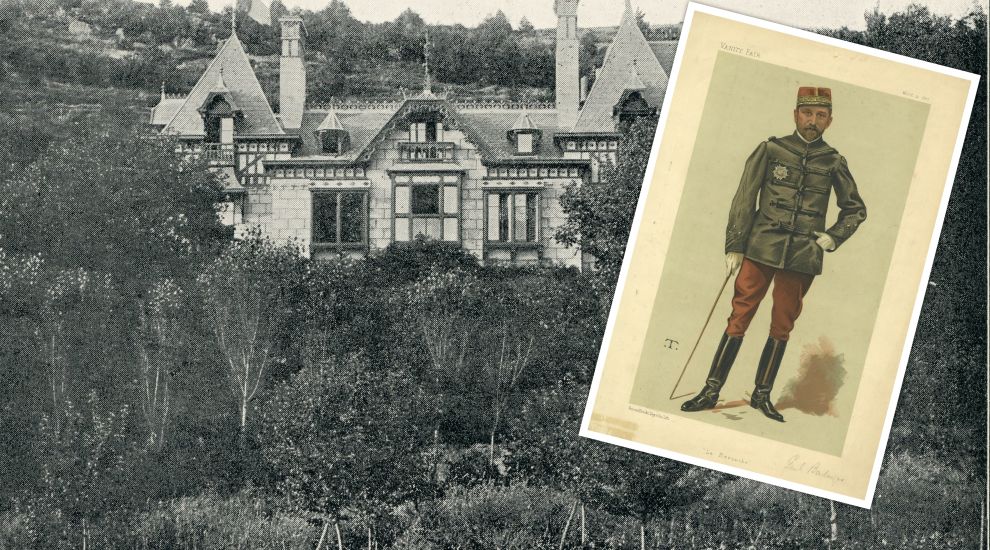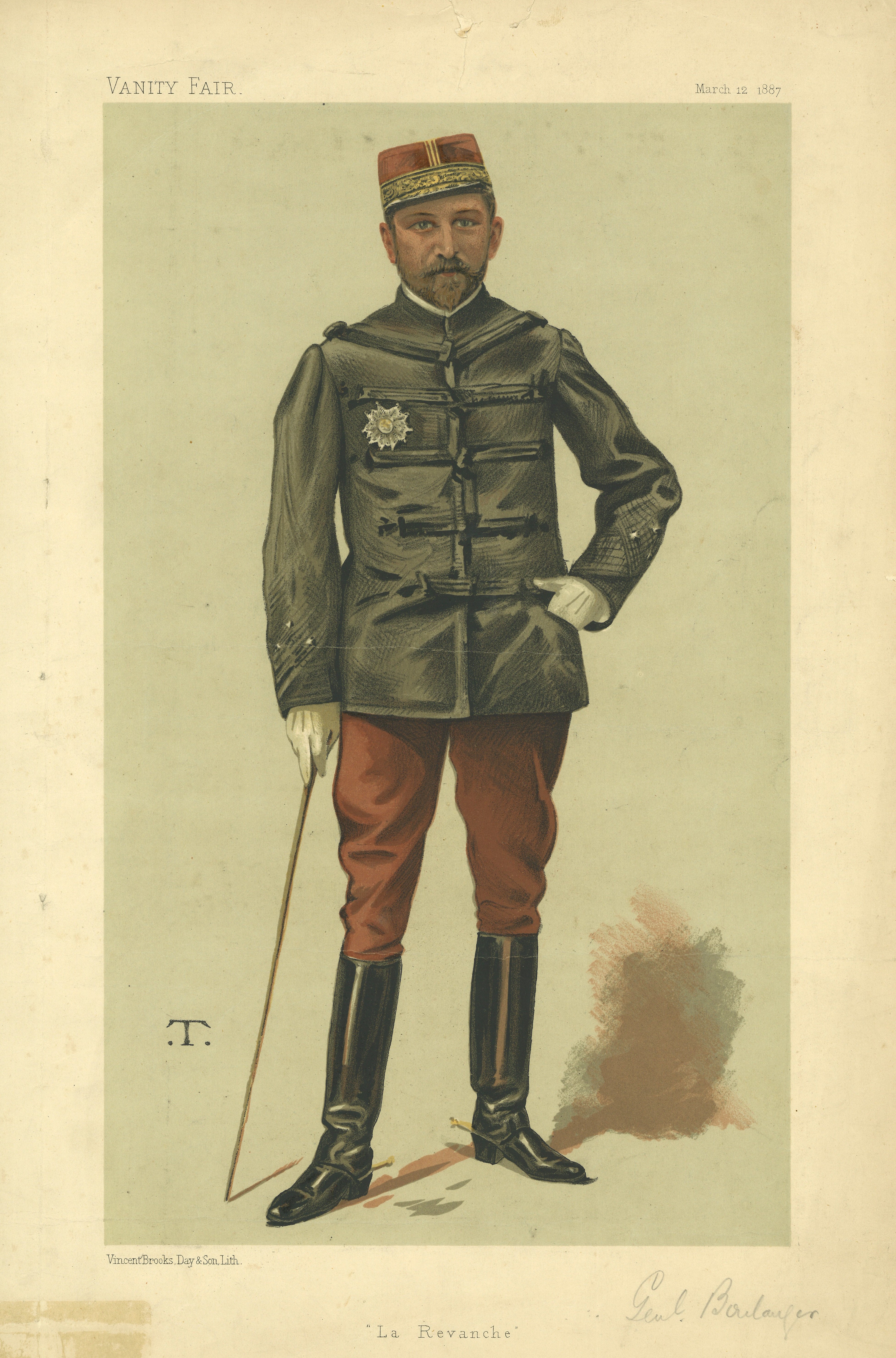


The French General, Georges Ernest Boulanger, was a controversial figure in the 19th century. As a soldier turned popular politician, his influence was viewed as a threat and he was accused of treason. Boulanger was forced to leave France and he arrived in Jersey seeking refuge 135 years ago this month...
Boulanger had been born in 1837 in Rennes, the son of a French father and a Welsh mother.
He had served in Algeria and Italy before taking part in the Franco-Prussian War. He rose up the ranks before entering the political arena and being made Minister of War for France in 1886.
His popularity grew to such an extent that he was seen as a threat to the Republic, encouraged by supporters on a couple of occasions to engage in a coup d’état and install himself as a dictator.
But Boulanger failed to act decisively and the French Government detected his weakness, introducing new election legislation to curtail his power grab and bringing charges against him for conspiracy and treason.

Pictured: Georges Ernest Boulanger was a controversial soldier-turned-politician in the 19th century.
Rather than staying to fight the accusations, Boulanger fled to Brussels with his mistress, Madame Bonnemain. After a brief stay, they moved to a house in Portland Place in London, before deciding to move to Jersey.
Boulanger arrived in the island from Weymouth on 8 October 1889 aboard the Great Western Railway Company’s steamer, Antelope. He was greeted at the harbour by a number of supporters, who cheered his arrival.
A newspaper article reported that the crossing was rough and at one point his female companion was thrown from her berth, receiving a severe blow to her forehead.
The Star reported on 17 October 1889 that Boulanger chose to stay at the principal hotel of the island, the Pomme d’Or Hotel, making himself comfortable: ‘He has furnished his own rooms, has taken with him his own silver, and has hung several pictures and portraits upon the walls.’
The only visitor who had come to see him at that point was Dr Chappuis, who checked on his injured companion.
It had been suggested that he was looking to rent a private residence but the report said this was untrue. Boulanger refused to give interviews to anybody and ‘his chief distraction so far consists in drives into the country in a closed carriage’.
During these country drives, he started to take in some of the local attractions. The Nouvelle Chronique de Jersey reported that by the middle of October, he had already visited Mont Orgueil Castle, the bay at Grève de Lecq and the Troglodyte Caves at Five Oaks, a memory that would remain with the owner of the caves, Mr Champion, for a long time.
Although separated from France by a channel of water, Boulanger was still a powerful figure in French politics. A delegation of French deputies saw him soon after his arrival, presenting him with an address of sympathy and a basket of red carnations, the General’s favourite flower.
Soon after, the ‘Manifesto of General Boulanger’, addressed to the nation of France, was published in the Nouvelle Chronique.
On 14 November 1889, The Star reported that General Boulanger attended the Jersey Theatre Royal. He was greeted with enthusiasm, with the band playing Boulanger’s march and the crowd cheering.
He rose to bow to the audience with them shouting back: ‘Vive Boulanger.’ The performance concluded with the band playing the Marsellaise.
On 28 January 1890, the Sheffield Daily Telegraph reported that after some discussion, he was invited to attend a dinner of the First Regiment of the Royal Jersey Militia and had accepted the invitation. However, concerns were raised at the Government Office and the invitation was withdrawn.
Members of the Boulangist movement continued to visit. The South Wales Daily News reported on 5 April 1890 that about 40 members of the Boulangist party arrived in the island to hold a conference with the General.
He continued to refuse their request for him to return to France to fight the charges against him. The article noted that ‘General Boulanger continues to live at his hotel in semi-privacy, receiving few visitors, but driving or riding out almost daily’.
On 29 April 1890, the General took up residence at Château des Roches, a prominent newly built property in St Brelade’s Bay and owned by French merchant Jules Vanier. The house was already something of a tourist attraction because of its unique style, but this only increased after the General moved in.

Pictured: Boulanger took up residence in Château des Roches in St Brelade's Bay.
A report in the London Evening News on 21 July 1890 about his life in his new house said: ‘The General finds Jersey very dull…, and exile is the more bitter to him from knowledge of the fact that politically he is “done for” for ever and ever.
Rising at ten o’clock, he takes his morning meal, goes out on horseback or in a carriage, dines, and – goes to bed. Such is his daily routine. He receives his visitors listlessly, and in all respects he is a changed man.’
Boulanger permanently left Jersey on 1 May 1891, vacating his villa in St Brelade earlier in the week to briefly stay at the Stopford Hotel. He took the ship, Frederica, with his mistress Madame Bonnemain, on their way to Brussels.
The Evening Standard commented that ‘Jersey was a distinctly dull place to live in, and General Boulanger being, by some mysterious means, in the possession of sufficient funds to gratify his taste for luxury, is, perhaps, right to move to gayer Brussels, which city in many respects will remind him of Paris’.
However, he was not able to enjoy his new environs for long. Tragedy struck a couple of months later when Madame Bonnemain contracted tuberculosis, dying in Boulanger’s arms. She was buried at Ixelles Cemetery.
Just a couple of months later, on 30 September, Boulanger visited her grave and took his own life by shooting himself in the head. He was buried in the same grave.
This story was told as part of a series in collaboration with Jersey Heritage.
To uncover more stories like this, visit Jersey Archive or check out its online catalogue here.
Comments
Comments on this story express the views of the commentator only, not Bailiwick Publishing. We are unable to guarantee the accuracy of any of those comments.